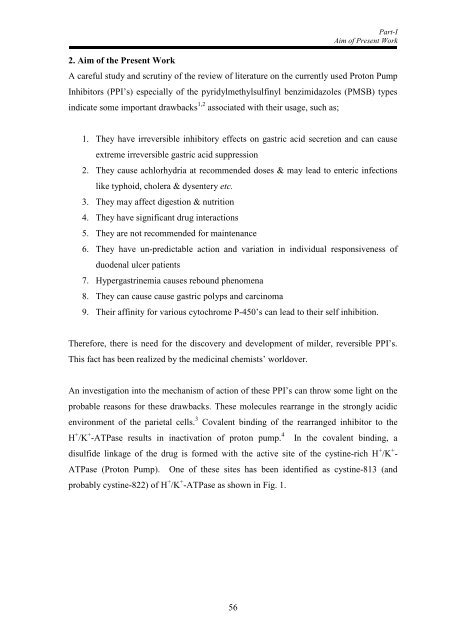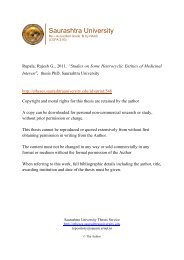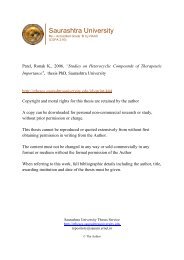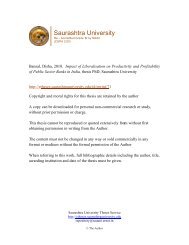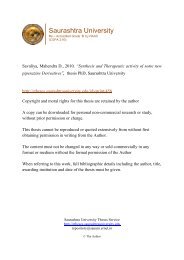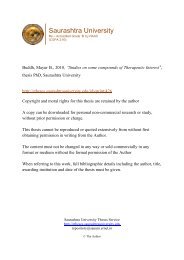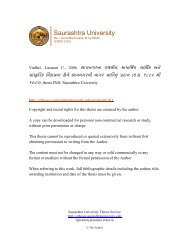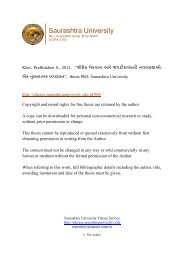- Page 1 and 2:
Saurashtra UniversityRe - Accredite
- Page 3 and 4:
Statement Under O.Ph.D. 7 of Sauras
- Page 5 and 6:
ContentsAcknowledgementRegistration
- Page 7 and 8:
Contents1.2 Synthesis of condensed
- Page 9 and 10:
Contents1.5 MDR modulators 3981.6 D
- Page 11 and 12:
infrastructure and all the faciliti
- Page 13 and 14:
Above all I thank Lord Hanuman Ji a
- Page 15 and 16:
Abbreviations used1 H NMR Proton Nu
- Page 17 and 18:
UVVEGFRWCRWHOZ-EUltra VioletVascula
- Page 19 and 20:
22. 2-Substitutedthieno[3,2-d]/benz
- Page 21 and 22:
PrefacePrefaceHeterocyclic chemistr
- Page 23 and 24:
PrefaceThis entire cascade of react
- Page 25 and 26:
PrefaceOONHNHPOCl 3MWINVi-xviiClClC
- Page 27 and 28:
PrefaceOOHOOOONHNHDP-7 1NHMonastrol
- Page 29 and 30:
PART-I
- Page 31 and 32:
3.7 Results and discussion on biolo
- Page 33 and 34:
Part-1Review on Antiulcer Literatur
- Page 35 and 36:
Part-1Review on Antiulcer Literatur
- Page 37 and 38: Table 2: Distinguishing Features of
- Page 39 and 40: Part-1Review on Antiulcer Literatur
- Page 41 and 42: 1.2.2. Muscarinic AntagonistsPart-1
- Page 43 and 44: Part-1Review on Antiulcer Literatur
- Page 45 and 46: Part-1Review on Antiulcer Literatur
- Page 47 and 48: Part-1Review on Antiulcer Literatur
- Page 49 and 50: Part-1Review on Antiulcer Literatur
- Page 51 and 52: Part-1Review on Antiulcer Literatur
- Page 53 and 54: Part-1Review on Antiulcer Literatur
- Page 55 and 56: 1.5.5. Pharmacological PropertiesPa
- Page 57 and 58: Part-1Review on Antiulcer Literatur
- Page 59 and 60: Part-1Review on Antiulcer Literatur
- Page 61 and 62: Part-1Review on Antiulcer Literatur
- Page 63 and 64: Part-1Review on Antiulcer Literatur
- Page 65 and 66: Part-1Review on Antiulcer Literatur
- Page 67 and 68: Part-1Review on Antiulcer Literatur
- Page 69 and 70: Part-1Review on Antiulcer Literatur
- Page 71 and 72: Part-1Review on Antiulcer Literatur
- Page 73 and 74: Part-1Review on Antiulcer Literatur
- Page 75 and 76: Part-1Review on Antiulcer Literatur
- Page 77 and 78: Part-1Review on Antiulcer Literatur
- Page 79 and 80: Part-1Review on Antiulcer Literatur
- Page 81 and 82: Part-1Review on Antiulcer Literatur
- Page 83 and 84: Part-1Review on Antiulcer Literatur
- Page 85 and 86: Part-1Review on Antiulcer Literatur
- Page 87: Part-1Review on Antiulcer Literatur
- Page 91 and 92: Part-IAim of Present WorkR 2 OR 3 R
- Page 93 and 94: 2.2. Bacisity of Pyridine vs Pyrimi
- Page 95 and 96: Part-IAim of Present WorkOANNHOSNHN
- Page 97 and 98: Part-IAim of Present WorkS. No. A S
- Page 99 and 100: 3. Results and Discussion
- Page 101 and 102: Part-IResults and Discussion3.1.1d
- Page 103 and 104: Part-IResults and DiscussionOR 1XR
- Page 105 and 106: Part-IResults and Discussionformed
- Page 107 and 108: Part-IResults and DiscussionOOON 2
- Page 109 and 110: c. Synthesis of 2-carbethoxy-3-amin
- Page 111 and 112: Part-IResults and DiscussionTable 7
- Page 113 and 114: Part-IResults and DiscussionOOEtNHO
- Page 115 and 116: Part-IResults and DiscussionTable-8
- Page 117 and 118: Part-IResults and DiscussionCompd.N
- Page 119 and 120: Part-IResults and DiscussionStep-IY
- Page 121 and 122: S. No. Y Mol. Formula(Sol. ofrecrys
- Page 123 and 124: Part-IResults and DiscussionS. No.
- Page 125 and 126: Part-IResults and DiscussionS. No.
- Page 127 and 128: Part-IResults and DiscussionONNHIII
- Page 129 and 130: Part-IResults and DiscussionS. No.A
- Page 131 and 132: Part-IResults and DiscussionS. No.A
- Page 133 and 134: Part-IResults and DiscussionS. No.A
- Page 135 and 136: Part-IResults and Discussion3.5. Sp
- Page 137 and 138: Specimen 1 H NMR spectra of 2-chlor
- Page 139 and 140:
Part-IResults and Discussioninvolve
- Page 141 and 142:
Part-IResults and DiscussionSpecime
- Page 143 and 144:
The Infrared (IR) spectra:Part-IRes
- Page 145 and 146:
Part-IResults and DiscussionR 1ON+
- Page 147 and 148:
Part-IResults and DiscussionOSNHOSN
- Page 149 and 150:
3.6 Biological Evaluation of PPI’
- Page 151 and 152:
Part-IResults and DiscussionExperim
- Page 153 and 154:
Part-IResults and DiscussionDrug Pr
- Page 155 and 156:
Table 11. Effect of newly synthesiz
- Page 157 and 158:
Part-IResults and DiscussionS.No.AR
- Page 159 and 160:
Part-IResults and DiscussionS.No.AR
- Page 161 and 162:
Figure-1. Effect of newly synthesiz
- Page 163 and 164:
Figure-3. Effect of newly synthesiz
- Page 165 and 166:
Part-IResults and DiscussionFigure
- Page 167 and 168:
Part-IResults and DiscussionFigure
- Page 169 and 170:
Part-IResults and Discussion2. Effe
- Page 171 and 172:
Part-IResults and Discussionby kine
- Page 173 and 174:
Part-IResults and DiscussionNNNNNHN
- Page 175 and 176:
3.8. QSAR StudiesPart-IResults and
- Page 177 and 178:
Part-IResults and DiscussionFigure-
- Page 179 and 180:
Part-IResults and DiscussionPhysico
- Page 181 and 182:
Part-IResults and DiscussionS. No.
- Page 183 and 184:
Part-IResults and DiscussionThe MDS
- Page 185 and 186:
2. Volume of gastric secretion:Desc
- Page 187 and 188:
Part-IResults and DiscussionFor the
- Page 189 and 190:
Part-IResults and DiscussionTable-1
- Page 191 and 192:
3. Ulcer scoreDescription of the de
- Page 193 and 194:
Part-IResults and DiscussionTable-1
- Page 195 and 196:
Part-IResults and DiscussionTable-1
- Page 197 and 198:
Part-IResults and Discussion24. Ros
- Page 199 and 200:
4. Experimental
- Page 201 and 202:
Part-IExperimental119 o C was 128-1
- Page 203 and 204:
5. Synthesis of ethyl 2-amino-4-phe
- Page 205 and 206:
Part-IExperimentalthe procedure des
- Page 207 and 208:
Part-IExperimentalRecrystallization
- Page 209 and 210:
Part-IExperimentalM.P. : 132-134 o
- Page 211 and 212:
Part-IExperimentalA solution of thi
- Page 213 and 214:
Part-IExperimentalNMR (CDCl 3 )δpp
- Page 215 and 216:
Part-IExperimental6. Reaction of et
- Page 217 and 218:
Part-IExperimentalNMR (CDCl 3 )δpp
- Page 219 and 220:
Part-IExperimentalM.P. : 240-245 o
- Page 221 and 222:
Part-IExperimentalrecrystallization
- Page 223 and 224:
Part-IExperimental(1H, d, CH at imi
- Page 225 and 226:
Part-IExperimentalNMR (DMSO-d 6 )δ
- Page 227 and 228:
M.P. : 140-142 o C; Yield: 73%.Mol.
- Page 229 and 230:
M.P. : 135-141 o C; Yield: 67%.Mol.
- Page 231 and 232:
Part-IExperimentalml), over a perio
- Page 233 and 234:
Part-IExperimentalchloride was adde
- Page 235 and 236:
Part-IExperimental29. Synthesis of
- Page 237 and 238:
Part-IExperimentalIR (KBr) cm -1 :
- Page 239 and 240:
Part-IExperimentaladded while stirr
- Page 241 and 242:
Part-IExperimentald]pyrimidin-4(3H)
- Page 243 and 244:
Part-IExperimentalMol. formula : C
- Page 245 and 246:
Part-IExperimentalthis clear soluti
- Page 247 and 248:
Part-IExperimental21. Synthesis of
- Page 249 and 250:
Part-IExperimentalwhile maintaining
- Page 251 and 252:
Part-IExperimental30. Synthesis of
- Page 253 and 254:
Part-IExperimentalMol. Formula : C
- Page 255 and 256:
PART-II
- Page 257 and 258:
Part-IIContents2.3.2.1 Mononuclear
- Page 259 and 260:
Part-IISynthesis of Pyrimidines1. S
- Page 261 and 262:
Part-IISynthesis of PyrimidinesYZR
- Page 263 and 264:
Part-IISynthesis of Pyrimidineselec
- Page 265 and 266:
Part-IISynthesis of PyrimidinesR 1R
- Page 267 and 268:
Part-IISynthesis of Pyrimidinespyri
- Page 269 and 270:
R 1 R 2 R Yield(%)Part-IISynthesis
- Page 271 and 272:
R 1 R 2 R Yield(%)Part-IISynthesis
- Page 273 and 274:
R 1 R 2 R Yield(%)Part-IISynthesis
- Page 275 and 276:
Part-IISynthesis of Pyrimidinesyiel
- Page 277 and 278:
Table 27: 2-Amino-3-substitutedaryl
- Page 279 and 280:
Part-IISynthesis of PyrimidinesWhil
- Page 281 and 282:
Part-IISynthesis of PyrimidinesSimi
- Page 283 and 284:
Part-IISynthesis of PyrimidinesTabl
- Page 285 and 286:
R 1 R 2 R X Yield(%)Part-IISynthesi
- Page 287 and 288:
Part-IISynthesis of Pyrimidines+RCN
- Page 289 and 290:
Part-IISynthesis of PyrimidinesNN+
- Page 291 and 292:
Part-IISynthesis of PyrimidinesR 1+
- Page 293 and 294:
Part-IISynthesis of Pyrimidinesthe
- Page 295 and 296:
Part-IISynthesis of Pyrimidinesacet
- Page 297 and 298:
Part-IISynthesis of Pyrimidinesexpe
- Page 299 and 300:
Part-IISynthesis of PyrimidinesNOOC
- Page 301 and 302:
Part-IISynthesis of PyrimidinesThe
- Page 303 and 304:
Part-IISynthesis of PyrimidinesTabl
- Page 305 and 306:
Part-IISynthesis of PyrimidinesOH 3
- Page 307 and 308:
1.10 ReferencesPart-IISynthesis of
- Page 309 and 310:
Part-IISynthesis of Pyrimidines42.
- Page 311 and 312:
2. Impact of Microwave Assisted Hea
- Page 313 and 314:
Part-IIImpact of Microwave…Microw
- Page 315 and 316:
Part-IIImpact of Microwave…Figure
- Page 317 and 318:
Part-IIImpact of Microwave…R 1ArR
- Page 319 and 320:
Part-IIImpact of Microwave…as an
- Page 321 and 322:
Part-IIImpact of Microwave…al. 21
- Page 323 and 324:
Part-IIImpact of Microwave…XOHR 1
- Page 325 and 326:
Part-IIImpact of Microwave…N+N21B
- Page 327 and 328:
Part-IIImpact of Microwave…OO+ NO
- Page 329 and 330:
Part-IIImpact of Microwave…NO 2NO
- Page 331 and 332:
Part-IIImpact of Microwave…RNHNNH
- Page 333 and 334:
Part-IIImpact of Microwave…assist
- Page 335 and 336:
Part-IIImpact of Microwave…CNRNH
- Page 337 and 338:
Part-IIImpact of Microwave…Multig
- Page 339 and 340:
Part-IIImpact of Microwave…Nie et
- Page 341 and 342:
Part-IIImpact of Microwave…synthe
- Page 343 and 344:
Part-IIImpact of Microwave…An eff
- Page 345 and 346:
Part-IIImpact of Microwave…OO+S 8
- Page 347 and 348:
2.6. ReferencesPart-IIImpact of Mic
- Page 349 and 350:
49. Baxendale, I. R.; Ley, S. V. J.
- Page 351 and 352:
Part-IIAim of the Present Work3. Ai
- Page 353 and 354:
Part-IIAim of the Present WorkONHR
- Page 355 and 356:
Part-IIAim of the Present WorkYZXNN
- Page 357 and 358:
Part-IIAim of the Present WorkThe c
- Page 359 and 360:
3.5 References:Part-IIAim of the Pr
- Page 361 and 362:
Part-IIAim of the Present Work37. S
- Page 363 and 364:
Part-IIResults and Discussion4.1 Sy
- Page 365 and 366:
4.2 Synthesis of condensed 2-substi
- Page 367 and 368:
Table 38: Physical data of condense
- Page 369 and 370:
S. No. X Time ofMWIHeating(Min)VxiV
- Page 371 and 372:
S. No. X Time ofMWIHeating(Min)Yiel
- Page 373 and 374:
4.3 Synthesis of condensed 4-chloro
- Page 375 and 376:
Part-IIResults and DiscussionHerein
- Page 377 and 378:
Part-IIResults and DiscussionS. No.
- Page 379 and 380:
Part-IIResults and DiscussionS. No.
- Page 381 and 382:
The Mass spectraPart-IIResults and
- Page 383 and 384:
Specimen IR spectra of some 2-chlor
- Page 385 and 386:
Specimen IR spectra of some 2-chlor
- Page 387 and 388:
Part-IIResults and Discussion1 H NM
- Page 389 and 390:
Part-IIResults and Discussionion (c
- Page 391 and 392:
Specimen IR spectra of some 4-chlor
- Page 393 and 394:
Specimen 1 H NMR spectra of 4-chlor
- Page 395 and 396:
Part-IIResults and Discussion4.5 MD
- Page 397 and 398:
Part-IIResults and DiscussionH 3CO1
- Page 399 and 400:
Part-IIResults and DiscussionCl14.
- Page 401 and 402:
Part-IIResults and DiscussionO14. V
- Page 403 and 404:
4.6 References:Part-IIResults and D
- Page 405 and 406:
5. ExperimentalPart-IIExperimentalA
- Page 407 and 408:
3. Synthesis of 2-chloromethyl-5-ph
- Page 409 and 410:
Part-IIExperimentalIR (KBr) cm -1 :
- Page 411 and 412:
Part-IIExperimentalM.P. : 247-249 o
- Page 413 and 414:
Part-IIExperimental5.4 Synthesis of
- Page 415 and 416:
Part-IIExperimentalwere reacted und
- Page 417 and 418:
27. Synthesis of 2-methyl-5-phenylt
- Page 419 and 420:
Part-IIExperimental80 o C) that yie
- Page 421 and 422:
Part-IIExperimental36. Synthesis of
- Page 423 and 424:
Part-IIExperimentalunder microwave
- Page 425 and 426:
Part-IIExperimentalM.P. : >300 o C
- Page 427 and 428:
M.P. : 280-282 o C; Yield: 90%Mol.
- Page 429 and 430:
5.10 References:Part-IIExperimental
- Page 431 and 432:
Synthesis, Characterization and Ant
- Page 433 and 434:
Part-IIIAdvances Dihydropyridines a
- Page 435 and 436:
Part-IIIAdvances Dihydropyridines a
- Page 437 and 438:
Part-IIIAdvances Dihydropyridines a
- Page 439 and 440:
Part-IIIAdvances Dihydropyridines a
- Page 441 and 442:
Part-IIIAdvances Dihydropyridines a
- Page 443 and 444:
Part-IIIAdvances Dihydropyridines a
- Page 445 and 446:
Part-IIIAdvances Dihydropyridines a
- Page 447 and 448:
Part-IIIAdvances Dihydropyridines a
- Page 449 and 450:
Part-IIIAdvances Dihydropyridines a
- Page 451 and 452:
Part-IIIAdvances Dihydropyridines a
- Page 453 and 454:
Part-IIIAdvances Dihydropyridines a
- Page 455 and 456:
CH 3CH 3Part-IIIAdvances Dihydropyr
- Page 457 and 458:
Part-IIIAdvances Dihydropyridines a
- Page 459 and 460:
Part-IIIAdvances Dihydropyridines a
- Page 461 and 462:
Part-IIIAdvances Dihydropyridines a
- Page 463 and 464:
Part-IIIAdvances Dihydropyridines a
- Page 465 and 466:
Part-IIIAdvances Dihydropyridines a
- Page 467 and 468:
Part-IIIAdvances Dihydropyridines a
- Page 469 and 470:
Part-IIIAdvances Dihydropyridines a
- Page 471 and 472:
Part-IIIAdvances Dihydropyridines a
- Page 473 and 474:
Part-IIIAdvances Dihydropyridines a
- Page 475 and 476:
Part-IIIAdvances Dihydropyridines a
- Page 477 and 478:
Part-IIIAdvances Dihydropyridines a
- Page 479 and 480:
Part-IIIAdvances Dihydropyridines a
- Page 481 and 482:
Part-IIIAdvances Dihydropyridines a
- Page 483 and 484:
Part-IIIAdvances Dihydropyridines a
- Page 485 and 486:
Part-IIIAdvances Dihydropyridines a
- Page 487 and 488:
Part-IIIAdvances Dihydropyridines a
- Page 489 and 490:
Part-IIIAdvances Dihydropyridines a
- Page 491 and 492:
Part-IIIAdvances Dihydropyridines a
- Page 493 and 494:
Part-IIIAdvances Dihydropyridines a
- Page 495 and 496:
Part-IIIAdvances Dihydropyridines a
- Page 497 and 498:
2. Aim of the Present Work
- Page 499 and 500:
Part-IIIAim of the Present Workshor
- Page 501 and 502:
3. Results and Discussion
- Page 503 and 504:
Part-IIIResults and DiscussionOOOHR
- Page 505 and 506:
Part-IIIResults and DiscussionUsing
- Page 507 and 508:
Part-IIIResults and DiscussionS. No
- Page 509 and 510:
S. No R X MolFormula(Sol. of Recrys
- Page 511 and 512:
Part-IIIResults and Discussionpheny
- Page 513 and 514:
Specimen 13 C NMR spectra of some D
- Page 515 and 516:
Part-IIIResults and DiscussionTable
- Page 517 and 518:
Part-IIIResults and DiscussionTable
- Page 519 and 520:
3.5 DiscussionPart-IIIResults and D
- Page 521 and 522:
4. Experimental
- Page 523 and 524:
Part-IIIExperimentalglacial acetic
- Page 525 and 526:
Part-IIIExperimental5. Synthesis of
- Page 527 and 528:
Part-IIIExperimentalIR(KBr) cm -1 :
- Page 529 and 530:
Part-IIIExperimentalM.P. : 184-186
- Page 531 and 532:
Part-IIIExperimental1 H NMR(DMSO-d
- Page 533 and 534:
Part-IIIExperimentalM.P. : 188-190
- Page 535 and 536:
Part-IIIExperimental4.2 MDR reversa
- Page 537 and 538:
Summary and Conclusion
- Page 539 and 540:
Summary and Conclusionactivity in P
- Page 541 and 542:
Summary and Conclusionreverting act
- Page 543 and 544:
Publications and Presentations
- Page 545 and 546:
Publications and PresentationsOther
- Page 547:
Publications and Presentations8. K.


